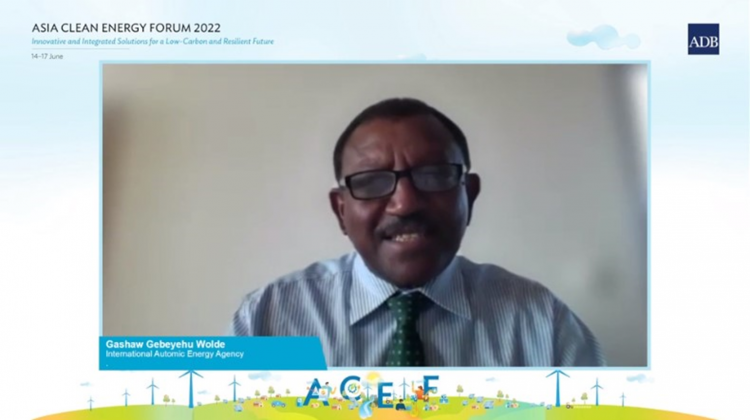Energy planning can hold the key to effectively addressing challenges related to climate change, air quality, energy security and resource limitations, agreed participants of a three-day virtual workshop, organized by the IAEA from 19 to 21 July in cooperation with the Asian Development Bank (ADB).
Energy planning is directly linked to national development and to sustainable national development-reliable access to clean, affordable and safe energy is a cornerstone of economic growth and improved human well-being. Through its technical cooperation programme, the IAEA offers a broad variety of training programmes, knowledge sharing fora and technical guidance to help countries chart out their energy strategies on the basis of future energy demand models and projections.
Organized through an ongoing regional project[1] and in the framework of the Regional Cooperative Agreement for Asia and the Pacific (RCA), the workshop provided an opportunity for ADB, United Nations Economic Commission for Europe (UNECE) and IAEA experts to showcase existing opportunities for capacity building and training in the use of the Agency's energy planning tools.
The 25 attending experts from across Asia and the Pacific attended a series of presentations setting out the foundations of energy demand and supply modelling, including a demonstration of the IAEA's Model for Energy Supply System Alternatives and the General Environmental Impacts (MESSAGE) tool.
With the basic scientific concepts, tools and procedures of energy modelling established, expert lecturers at the workshop provided guidance on how various social, economic and technological driving factors can affect the scenarios modelled by energy planners. For instance, models which prioritize low energy costs may delay the realization of national climate targets, whereas scenarios in which low-carbon sources are subsidized would accelerate progress towards those targets.
An in-person regional workshop for RCA countries will take place from 10 to 21 October as a follow-up to the three-day virtual workshop. The in-person event will focus on IAEA energy planning tools, including MESSAGE.

Gashaw Wolde, Section Head in the IAEA's TC Division for Asia and the Pacific, delivered remarks to the virtual workshop. (Photo: IAEA)
Expanding Cooperation with the Asian Development Bank
The July ADB-IAEA workshop builds on earlier events co-organized by the two organizations, which were designed to highlight the economic and development challenges which can act as barriers to a smooth transition to clean energy.
An IAEA side event on the margins of the Asian Development Bank's 2022 Clean Energy Forum, on 15 June 2022, underscored the value of integrated energy systems planning and introduced several modelling tools to attendees, These modelling tools can support an approach to long-term energy planning which is compatible with both national social development goals and global climate targets.
"Training in the IAEA's MESSAGE tool is central to our efforts. This software is designed to set up optimization models of energy supply systems to assess capacity expansion, related investments, environmental impacts and policies applicable at the national, sub-regional or regional levels," explained Andrii Gritsevskyi, Head of the Planning and Capacity Building Unit at the IAEA.
The 15 June event also provided an opportunity for Henri Paillere, Head of the IAEA Planning and Economic Studies Section, to present the links between energy planning and the critical topics of climate change and sustainability. "We can still curb global emissions and secure a liveable future with the tools and know-how that we already possess in the international community," said Paillere, drawing attention to the findings of the Mitigation Report published by Working Group Three of the Intergovernmental Panel on Climate Change (IPCC).
This coordination through the framework of RCA has served as a pathway to bolster cooperation outlined through the current Cooperative Framework Agreement between the IAEA and ADB in several other areas outside of energy planning, including cooperation in human health, animal health, and environment and plastics.
[1] RAS0086, 'Enhancing the Management and Implementation of Activities under the Framework (RCA)'






